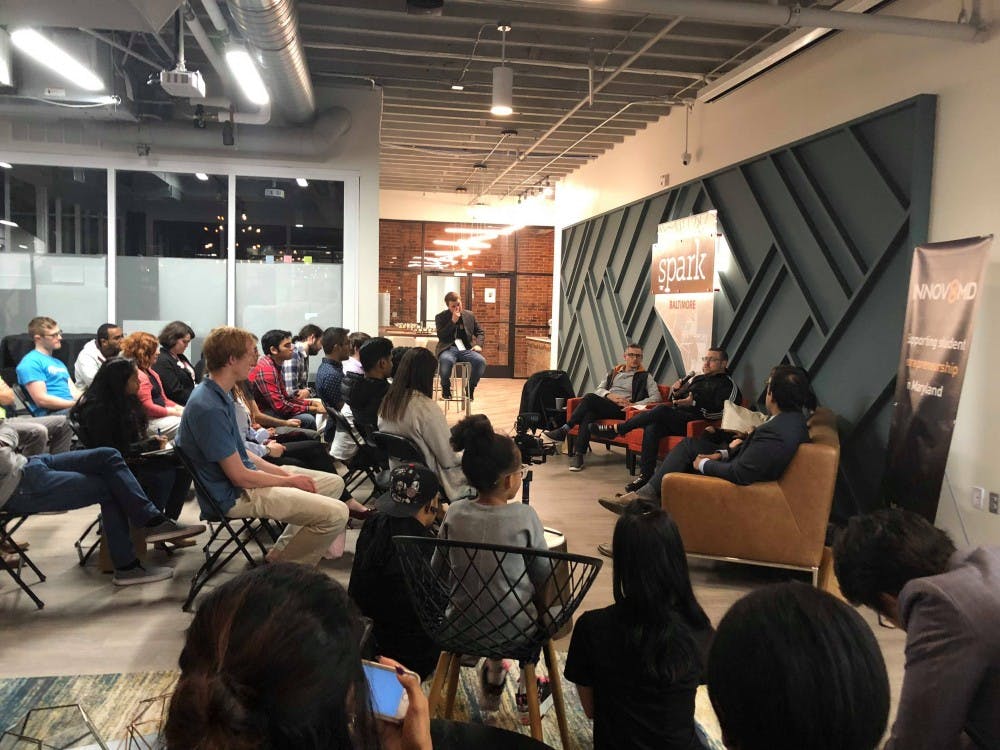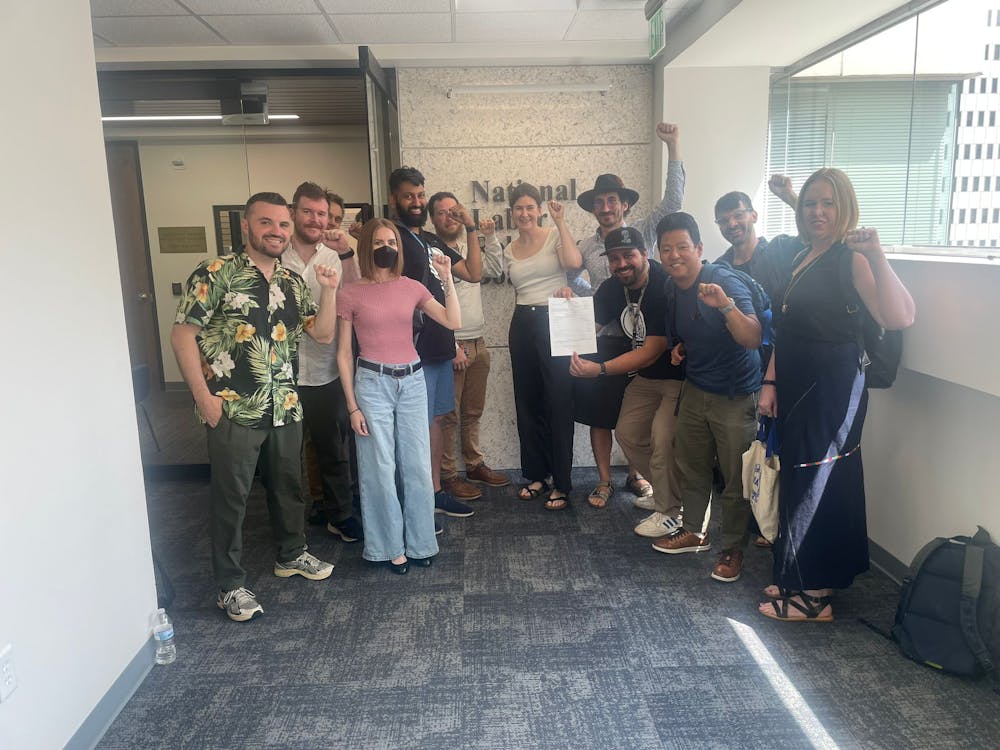Eight Maryland universities hosted the first annual Innov8MD Entrepreneurship Conference at Spark Baltimore in the Inner Harbor on Friday, Nov. 9. Participating universities included Hopkins, the University of Maryland, Morgan State University, Maryland Institute College of Art and the University of Baltimore, among other Maryland schools.
Entrepreneurial leaders across eight universities came together to form the Maryland Collegiate Entrepreneurship Coalition, which aims to further student innovation across the state.
To begin the Conference, student startups presented demos for the early stages of their companies.
Hopkins junior Pascal Acree, a member of the startup Kubanda Cryotherapy, talked about how entrepreneurship conferences like Innov8MD give students the opportunity to discover and interact with the Baltimore startup community.
“Hopkins doesn’t really publicize what’s going on outside of campus,” Acree said. “Events like this allow us to see what other student entrepreneurs in Maryland are doing.”
Hopkins sophomore Simon Liu is a member of Health 3D, a student-run social enterprise that creates 3D-printed equipment to fill treatment gaps in health care. Liu explained that the Conference created new opportunities for collaboration and networking.
“When you talk to some of the other companies, you quickly realize that they run into the same challenges as entrepreneurs,” said Liu. “Conferences like this allow us to exchange tips and suggestions to work through these problems.”
Brian Hill, a student at Bowie State University, is one of the founders of GoFech, a new mobile platform that aims to meet the millennial needs of advertising and promoting. He emphasized the importance of not only fostering entrepreneurship on college campuses but also creating opportunities for students to share their innovations.
“These conferences allow us to put our names out there,” Hill said. “You’ve got to have opportunities for networking past the social networking communities online like LinkedIn.”
Student innovators listened to a speech by keynote speaker Burck Smith. Smith is the founder of StraighterLine, a company focused on tackling the skyrocketing cost of college by providing low-cost online courses.
Smith emphasized that one of the biggest challenges most entrepreneurs face is the fear of failure. According to him, having maker spaces and entrepreneurship opportunities on college campuses is the most effective way to support student entrepreneurs.
“You’ve got to set up an environment where students are not afraid to fail by letting them know there is a plan B,” he said.
Smith explained that the most important components of successful entrepreneurship are humility, trust and luck. According to him, every good innovator should be prepared to be wrong, surround themselves with the right people and seek out opportunities like Innov8MD.
“I don’t underestimate the power of luck, but I also believe in making your own luck,” Smith said. “Pursue enough opportunities, meet enough of the right people and eventually you’ll get lucky.”
He encouraged students to explore different interests throughout college and to get involved in innovation, regardless of their major.
“Get a grasp on how the world works,” Smith said. “Then identify some problems and try to fix them.”
Sean Lane, CEO of Olive AI and co-founder of innovation hub Betamore, opened the second speaker session. He discussed the importance of giving back to the community with his work.
“I realized that the most fulfilling thing that I could do was help other people make millions, instead of focusing on growing my own business,” Lane said.
Next, Tammira Lucas, the founder of a business that provides childcare services to women entrepreneurs, explained that procuring funds for business ideas is often the most difficult aspect of entrepreneurship.
“I would advise students to take advantage of the funding and support provided on a college campus,” she said.
Stephen Babcock, market editor for Technical.ly Baltimore, added that it’s important that the startup opportunities facilitate interactions with the city they live in and helps them understand the full impact that they can have. According to Babcock, only seven percent of the social capital coming out of Hopkins remains in Baltimore.
“Nourishing the entrepreneur ecosystem of Baltimore is key to helping retain some of this talent and ensuring that the benefits of these prestigious universities are pouring back into the economy,” Babcock said.
Greg Cangialosi, a co-founder of Betamore alongside Lane, explained that just over the past four to five years, the startup ecosystem of Baltimore has grown exponentially, significantly expanding to other industries like health care and cybersecurity.
“The glue is starting to stick, and we’re starting to see more and more students staying behind after graduating,” Cangialosi said.
Mustafa Wahid, the last speaker, explained how a big challenge is increasing awareness of the programming available to students. His company, TransitioningU, focuses on trying to increase graduation rates on college campuses by building a student support system that connects students to various opportunities.
“Retaining talent at the university means retaining talent in Maryland, and unfortunately, there are way too many students leaving after they finish their education,” he said. “They just don’t know about all the hidden gems that are available to them.”
Senior Pava LaPere, one of the organizers of Innov8MD, is also the president and co-founder of Technology, Creativity, Opportunity (TCO) Labs, a student-run nonprofit that aims to foster a stronger entrepreneurial environment at Hopkins. She echoed Wahid’s sentiment and expanded on the importance of having students directly interact with Baltimore through entrepreneurship events like Innov8MD.
“If we can show students how amazing Baltimore’s innovation ecosystem is, it is more likely that they will keep their company in the city,” LaPere said. “Not only is Baltimore an incredibly affordable place to live, but its entrepreneurial ecosystem has likewise ballooned in the past decade.”
LaPere said that when she arrived on campus, there was no programming for students interested in entrepreneurship.
“Instead of accepting that there wasn’t a community for student entrepreneurs, we decided to build one via TCO Labs” said LaPere. “Two years later, the University caught on and launched FastForwardU, which supports students from the top-down.”
Now, between TCO Labs and FastForwardU, an innovation hub at Hopkins, there are over 20 events each year related to entrepreneurship, according to LaPere.
“We went from having no ecosystem to having a very robust one in three years,” she said.





